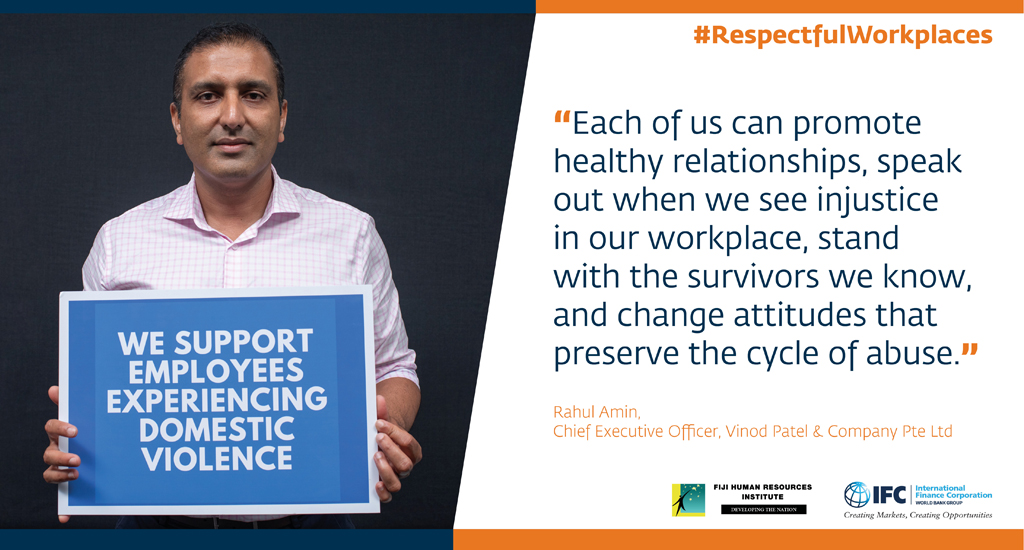
Rahul Amin, the Chief Executive Officer of Vinod Patel and Company Pte Ltd in Fiji believes it is possible to change perspectives of people who perpetrate violence against women.
“Each of us can promote healthy relationships, speak out when we see injustice in our workplace, stand with the survivors we know, and change attitudes that preserve the cycle of abuse,” Amin said.
The company is one of 28 that signed onto RAKORAKO: Building a Safe and Resilient Business workshop series organized by the Fiji Human Resources Institute (FHRI) and IFC with the support of the governments of Australia and New Zealand, to help the private sector address childcare demands and workplace responses to domestic and sexual violence.
“Companies survive only if they work to serve the nation and its people,” FMF Foods Ltd Managing Director, Ram Bajekal said. “It starts with caring for employees’ safety and well-being. That is why we implement workplace policies and practices on respectful workplaces.”
Fiji has one of the highest rates of domestic and sexual violence in the world with almost two-thirds of women experiencing domestic or sexual violence during their lifetime.
Across the world, the rate of gender-based violence has been increasing since the COVID-19 outbreak. In Fiji, two-thirds of companies who were surveyed by IFC in April this year believe the pandemic had increased employees’ experiences of domestic and sexual violence.
The violence also comes at a cost to business. A 2019 study by IFC The Business Case for Workplace Responses to Domestic and Sexual Violence revealed that the impact of domestic and sexual violence on businesses translate into lost staff time and reduced productivity of up to 10 days of lost work per employee each year.
It’s why IFC worked with the FHRI to deliver the RAKORAKO workshop series – to spread the message to companies that action in the workplace is good for the wellbeing of employees, and also improves the bottom lines of businesses.
“COVID-19 has seen an exponential growth in reported cases of gender-based violence. The private sector is well positioned to be part of the response,” FHRI President, Kameli Batiweti said.
“Ending gender-based violence is a national effort- we can, and all should be part of the solution,” said Deva De Silva, IFC Resident Representative for Fiji. “Our study had shown that having workplace responses to domestic and sexual violence is not only morally right but leads to more satisfied employees, ultimately improving business results.”
Through the RAKORAKO series, a number of companies have started implementing their own workplace responses to address the impact of domestic and sexual violence in their company workplaces.
Several companies now offer counselling services for staff and many will implement policies and mechanisms to support safe and respectful workplaces.
“Domestic violence is a national problem that affects our workers’ physical and mental health and their productivity,” Munro Leys managing partner, Jon Apted said. “As employers, we must do our part to enhance the safety and wellbeing of every member of our team.”